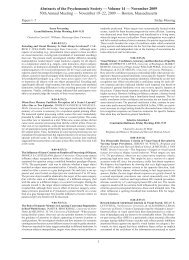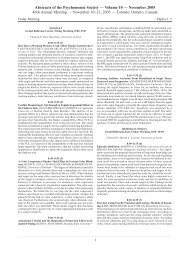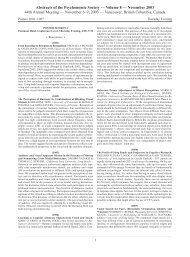S1 (FriAM 1-65) - The Psychonomic Society
S1 (FriAM 1-65) - The Psychonomic Society
S1 (FriAM 1-65) - The Psychonomic Society
You also want an ePaper? Increase the reach of your titles
YUMPU automatically turns print PDFs into web optimized ePapers that Google loves.
Posters 4069–4075 Saturday Noon<br />
• INHIBITION IN MEMORY •<br />
(4069)<br />
Arousal Reduces the Directed Forgetting of Words. MICHAEL<br />
MINNEMA & BARBARA J. KNOWLTON, UCLA—We measured<br />
the effect of performing an arousing task on subsequent directed forgetting.<br />
Subjects counted backward from 100 either by sevens (arousing)<br />
or by ones (nonarousing). Subjects then received a list of words<br />
that they were told to remember. In each arousal condition, subjects<br />
were either given a “forget” cue after the first list and were told that<br />
the list was just for practice and that they should try to forget it, or<br />
they were given a “remember” cue and were told that they should try<br />
to remember the list. All subjects were then told that they would receive<br />
a second list and that they should try to remember it. When later<br />
asked to recall all words, subjects in the arousal group showed significantly<br />
less forgetting of list 1 after the “forget” cue, with no difference<br />
after the “remember” cue. Arousal may deplete attentional resources<br />
needed for inhibition of to-be-forgotten information.<br />
(4070)<br />
Directed Forgetting or Directed Remembering? A Comparison of<br />
Remember, Forget, and Incidental Learning Instructions. MARK A.<br />
OAKES, PENNY L. YEE, AVERY RIZIO, JENNIFER SADOWSKY,<br />
TIERNEY BOISVERT, & CECILIA M. MAEYAMA, Hamilton College—Directed<br />
forgetting (DF) cost is observed when a person is instructed<br />
to forget stimuli that have been presented. Previous work on<br />
list method DF has attributed observations of cost to one of two mechanisms:<br />
increased remembering processes (increased rehearsal of<br />
R-items) or forgetting processes (episodic inhibition of F-items). In<br />
contrast, we examine the relative contributions of both types of<br />
processes to the observation of DF cost by comparing performance<br />
between remember and forget instructions with conditions in which<br />
participants receive an incidental memory instruction. <strong>The</strong> degree to<br />
which performance in the remember condition exceeds performance<br />
in the incidental condition will reflect the contribution of rehearsal<br />
processes, whereas the degree to which performance in the forget condition<br />
falls below the incidental condition will reflect the contribution<br />
of inhibition processes. <strong>The</strong> magnitude of these effects was also compared<br />
with measures of working memory capacity.<br />
(4071)<br />
Retrieval-Induced Forgetting: Inhibition or Interference? ANDREA<br />
D. HUGHES, University College of the Fraser Valley, ANTONIA<br />
KRONLUND, Brock University, & BRUCE W. A. WHITTLESEA,<br />
Simon Fraser University (sponsored by Bruce W. A. Whittlesea)—Inhibition<br />
as a psychological construct has been used to explain a wide<br />
range of cognitive behaviors including phenomena such as negative<br />
priming, inhibition of return, directed forgetting, and retrievalinduced<br />
forgetting. In general, these phenomena typically show a<br />
decrement in performance, measured by accuracy or reaction time,<br />
relative to a baseline response. Such decreases in performance have<br />
been argued to reflect inhibitory processes which serve to suppress a<br />
response to a stimulus. <strong>The</strong> central aim of the present research is to<br />
examine the utility of an inhibitory account of retrieval-induced forgetting.<br />
In particular, the experiments reported here demonstrate the<br />
limitations of an inhibitory account, and instead support an<br />
interference-based account of retrieval-induced forgetting.<br />
(4072)<br />
Can Combining Delay and Integration Reverse Retrieval-Induced<br />
Forgetting? JASON C. K. CHAN, KATHLEEN B. MCDERMOTT, &<br />
HENRY L. ROEDIGER III, Washington University (sponsored by<br />
Jason M. Watson)—Previous work has shown that integrative encoding<br />
(Anderson & McCulloch, 1999) and delay (24 h; MacLeod & Macrae,<br />
2001), in isolation, eliminate retrieval-induced forgetting (RIFO). In<br />
the present study, we examined the combined effects of integration<br />
and delay on RIFO using prose materials similar to those in college<br />
textbooks. We obtained reliable RIFO when integration of the prose<br />
115<br />
material was made difficult (by randomizing the presentation order of<br />
the sentences) and when the delay was short (20 min). No RIFO was<br />
observed when the materials were presented in a coherent fashion<br />
(high integration) or when the delay was long (24 h). When these two<br />
factors were combined (i.e., high integration and a long delay), we obtained<br />
retrieval-induced facilitation (replicating Chan, McDermott, &<br />
Roediger, 2006). Thus, the present work helps specify the conditions<br />
under which retrieval induces facilitation and inhibition.<br />
(4073)<br />
On the Persistence and Durability of Retrieval-Induced Forgetting.<br />
BENJAMIN C. STORM, ROBERT A. BJORK, & ELIZABETH LIGON<br />
BJORK, UCLA (sponsored by Robert A. Bjork)—Retrieval-induced<br />
forgetting is believed to reflect inhibitory control processes that reduce<br />
the accessibility of items that interfere with attempts to retrieve target<br />
items from memory. To date, however, very little research has explored<br />
the persistence and durability of the phenomenon. Recently, we have<br />
shown that although retrieval-induced forgetting may make items less<br />
recallable initially, such items will benefit more from future learning<br />
than will items that did not initially suffer from retrieval-induced forgetting.<br />
Here, we report the long-term consequences of repeatedly inducing<br />
and releasing the effect of retrieval-induced forgetting. Our results<br />
suggest that, given the same number of study trials, items that<br />
were intermittently inhibited between study trials were more recallable<br />
after a week delay than were items that were not intermittently inhibited<br />
between study trials. This counterintuitive finding is discussed in<br />
relation to the inhibitory account of retrieval-induced forgetting and<br />
the new theory of disuse (Bjork & Bjork, 1992).<br />
(4074)<br />
Is Source Memory Subject to Retrieval-Induced Forgetting? JERI<br />
LITTLE, ELIZABETH LIGON BJORK, ROBERT A. BJORK, & VIEN<br />
NGUYEN, UCLA (sponsored by Elizabeth Ligon Bjork)—Practicing<br />
the retrieval of some items can impair the retrieval of related, but unpracticed,<br />
items—an effect known as retrieval-induced forgetting<br />
(RIF), argued to arise from inhibitory processes (Anderson, Bjork, &<br />
Bjork, 1994). <strong>The</strong> present research asked whether RIF would occur for<br />
both item memory and source memory—in particular, the identity of<br />
items as well as their location in a display. Participants studied 6 exemplars<br />
from each of 10 categories, with the exemplars presented<br />
three at a time in a triangular formation above their category name.<br />
Participants were then given retrieval practice on 3 exemplars (from<br />
5 categories each) in their previously presented positions. After a<br />
filled delay, both item memory and source memory were assessed,<br />
with preliminary results indicating RIF effects for item memory but<br />
not for source memory, implying that perhaps certain types of information<br />
associated with a given item—such as its location—remain retrievable<br />
even when access to its identity has been inhibited.<br />
(4075)<br />
Individual Differences in Inhibitory Control: RIF, TNT, and OCD.<br />
BENJAMIN C. STORM, MONICA BIRNBAUM, ELIZABETH<br />
LIGON BJORK, & ROBERT A. BJORK, UCLA—Retrieval-induced<br />
forgetting is believed to reflect the lasting consequences of inhibitory<br />
control in memory. According to this account, attempting to retrieve a<br />
target item from memory also activates other items, creating competition,<br />
and requiring that such competing items be inhibited. Similar<br />
control processes have also been argued to play a role in allowing participants<br />
in think/no-think experiments to prevent unwanted memories<br />
from coming into awareness. Subjects in the present research took part<br />
in both a retrieval-induced forgetting experiment and a think/no-think<br />
experiment. If the forgetting observed in the respective paradigms reflects<br />
similar inhibitory control processes, performance on the two experiments<br />
should be highly correlated. <strong>The</strong> present research also explored<br />
the relationship between performance on these two paradigms<br />
and obsessive compulsive disorder, with the hypothesis that individuals<br />
who experience recurrent, persistent, and unwanted thoughts and<br />
compulsions might have impaired inhibitory control.





